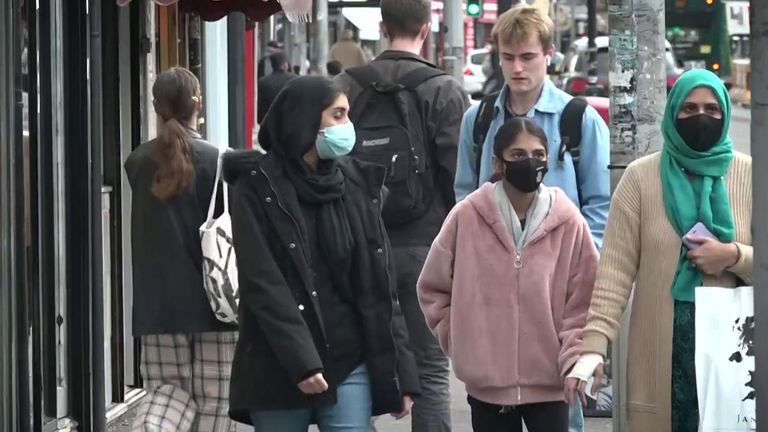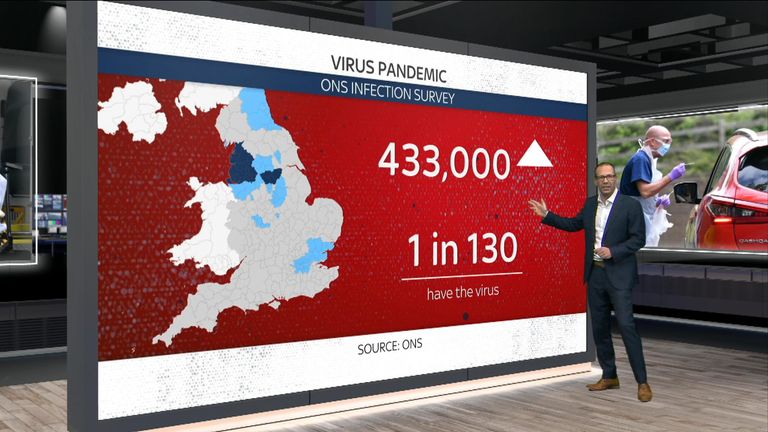Labour is claiming emergency stocks of some vital COVID-related drugs are running out ahead of a second wave of the pandemic.
Emily Thornberry, Labour‘s shadow international trade secretary, says the government’s own figures show many drug stockpiles are at zero.
The shortages include bacterial antibiotics and high-strength painkillers, according to figures published in parliament by the health minister Ed Argar.
Ms Thornberry is now calling on the government to spell out how it will replenish the supplies that are running out, either through imports or by boosting domestic capacity.
“Back in May, I asked trade ministers what they were doing to replace our stockpiles of essential medicines in case we faced another crisis in demand, and they assured me that action was being taken,” she said.
“But on the basis of these new figures, our current stockpiles appear well short of the levels we had this time last year, especially in respect of vital life-saving and pain relief medicines for hospitalised COVID patients.
“On an issue as important as this, the country needs decisive and effective leadership, and rapid action to get these stockpiles back up to last year’s levels.”
The shortages emerged after Ms Thornberry asked a parliamentary question to the Department of Health demanding to know how current drug stockpiles compare with a year ago.
In his reply, Mr Argar said: “The government continues to hold stockpiles of medicines to cope with a range of scenarios, and robust contingency planning continues to ensure that the country is prepared for a possible second peak of COVID-19 infections.
“The department has recently undertaken a tender exercise to source critical COVID-19 supportive medicines and a second tender exercise is currently live.
“This is a new stockpile and we are currently in the process of awarding contracts and taking and arranging for the delivery of supplies of some of these medicines.”
:: Subscribe to the All Out Politics podcast on Apple Podcasts, Google Podcasts, Spotify, Spreaker
The emergency stockpiles are known as the Essential Medicines Buffer Stock, which was created to support the NHS in the event of a pandemic or other health emergency by making sure the supply chain is uninterrupted.
During the first wave of coronavirus, earlier this year, medicine stockpiles were high, as ministers had built them up ahead of a possible no-deal Brexit at the end of last year.
But at the height of the lockdown in April, the government was forced to import 2.8 million packs of paracetamol from India after shoppers cleared supermarket and pharmacy shelves.
Ms Thornberry claims Mr Argar’s latest figures reveal Britain currently has no stockpiles of high-strength painkillers such as injectable morphine or the bacterial antibiotic doxycycline, used to treat pneumonia and COVID patients on ventilators.
Mr Argar’s figures show good supplies of adrenaline solution, magnesium sulphate, morphine sulphate, suxamethonium chloride solution and tinzaparin sodium solution.
But meropenem powder, an antibiotic used to treat bacterial side-infections, is down from 508,540 injections last year to 112,270 now.
And the following stockpiles are now down to zero:
- Doxycycline antibiotic, used to treat bacterial side-infections, down from 10,510,440 capsules last year
- Fentanyl opioid, down from 818,914 injections last year
- Morphine opioid: down from 1,115,656 injections last year
- Midazolam anaesthetic/sedative: 504,831 injections last year
- Levomepromazine, an antipsychotic drug used for palliative care, down from 84,565 injections last year
Earlier this year, ministers pledged to replenish stockpiles of essential medicines after figures revealed shortfalls in the buffer stock compared to last year.
The Department of Health admitted that supplies of drugs including asthma inhalers, antibiotics, paracetamol and ibuprofen appeared to have run low.







